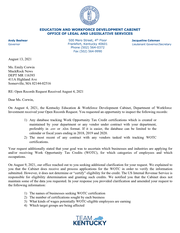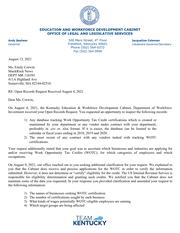KY WOTC database
| Submitted | Aug. 4, 2021 |
| Est. Completion | None |
MuckRock users can file, duplicate, track, and share public records requests like this one. Learn more.
Communications
From: Emily Corwin
To Whom It May Concern:
Pursuant to the Kentucky Open Records Act, I hereby request the following records:
1.) Any database tracking Work Opportunity Tax Credit certifications which is created or maintained by your department or any vendor under contract with your department, preferably in .csv or .xlsx format. If it is easier, the database can be limited to the calendar or fiscal years ending in 2018, 2019 and 2020.
2.) The most recent of any contracts with any vendors tasked with tracking WOTC certifications.
My goal is to ascertain which businesses and industries are applying for and/or receiving Work Opportunity Tax Credits, for which categories of employees and which occupations. If a conversation could help narrow or expedite the completion of this request, I am available at 802 233 4992 and emily_corwin@harvard.edu.
The requested documents will be made available to the general public, and this request is not being made for commercial purposes.
In the event that there are fees, I would be grateful if you would inform me of the total charges in advance of fulfilling my request. I would prefer the request filled electronically, by e-mail attachment if available or CD-ROM if not.
Thank you in advance for your anticipated cooperation in this matter. I look forward to receiving your response to this request within 3 business days, as the statute requires.
Sincerely,
Emily Corwin
From: Muckrock Staff
To Whom It May Concern:
I wanted to follow up on the following Kentucky Open Records Act request, copied below, and originally submitted on Aug. 4, 2021. Please let me know when I can expect to receive a response.
Thanks for your help, and let me know if further clarification is needed.
From: Education Workforce & Development
Ms. Corwin,
Thank you for your interest in the Kentucky Education and Workforce Development Cabinet. I want to seek clarification regarding your request so that the Cabinet can best assist you when it makes its formal response to your Open Records Request.
You have requested:
"1.) Any database tracking Work Opportunity Tax Credit certifications which is created or maintained by your department or any vendor under contract with your department, preferably in .csv or .xlsx format. If it is easier, the database can be limited to the calendar or fiscal years ending in 2018, 2019 and 2020.
2.) The most recent of any contracts with any vendors tasked with tracking WOTC certifications."
With the goal of ascertaining "which businesses and industries are applying for and/or receiving Work Opportunity Tax Credits, for which categories of employees and which occupations."
The Cabinet does receive and process applications for the Work Opportunity tax credit in order to verify the information submitted. However, it does not determine or "certify" eligibility for the credit. The U.S. Internal Revenue Service is the entity responsible for eligibility determination and granting such credits. In addition, the Cabinet does not maintain some of the data you requested. It collects the names of businesses and the job position for which the credit is being sought, but it does not maintain "categories of employees" or "occupations."
As you may know, federal law protects individual employee PII, including any data that might allow an employee to be identified. Therefore, it will not be possible to produce the entire database(s) you have requested without performing extensive redactions. At first glance, it appears that all we would be able to provide is the names of businesses who applied and the position titles, but only if such disclosure would not lead to the identification of an individual employee.
Based on this information, do you wish to revise your request?
Dondra J. Meredith
Deputy General Counsel
Education and Workforce Development
Office of Legal and Legislative Services
500 Mero Street-4th Floor
Frankfort, KY 40601
502-382-8032
[cid:image001.png@01D60816.F284F1F0]
CONFIDENTIALITY NOTICE
This e-mail message, together with any attachments, is intended only for the personal and confidential and exclusive use of the intended recipient(s) named above. This message may be an attorney-client communication or work product, and as such is privileged and confidential. If you are not the intended recipient(s), you are hereby notified that you have received this document in error and that any review, dissemination, distribution, or copying of this message is strictly prohibited and may be unlawful. If you have received this message in error, please return it to the sender, notify the sender immediately by telephone (502) 564-2611 or by return e-mail, and delete or destroy this message, along with any attachments, from your computer. It should be understood that the Office of the Governor cannot guarantee the security of the transmission and assumes no responsibility for intentional or accidental receipt by a third party.
From: Emily Corwin
Hi Dondra,
Thanks so much for your response. I had thought the state workforce agencies were responsible for certifying the employee's membership in a WOTC target group (but that the feds verify that the employee worked enough days for the business to qualify for the tax credits). Do I have that right?
Based on your email, I think we will be able to find a solution that isn't too burdensome for you and still is helpful for me. I am more than happy to chat on the phone if that would be easier: 802 233 4992.
Here are the elements I'm looking for, in order of importance to my reporting.
1. The names of businesses seeking WOTC certification
2. The number of certifications sought by each business
3. What kinds of wages potentially WOTC-eligible employees are earning
4. Which target groups are being affected.
5. What kind of work the WOTC-eligible employee was hired to do
An "ideal" data report might be a spreadsheet with a row for each tax credit sought. This would mean a business seeking multiple credits would have multiple rows. If necessary, you could leave out businesses seeking fewer than 5 tax credits, to protect employee identities. Perhaps you could provide those businesses' names only. Example row:
Business name | Wage or wage category | Target group | Job position
An alternative approach which would still be helpful might have a single row for each business, with other information in counts:
Business name | Count of credits sought | Count of wage category | Counts for each target group | Counts for each type of position
If you have concerns about any of this, don't hesitate to give me call, I can be flexible.
Many thanks,
Emily Corwin
From: Education Workforce & Development
Thanks Emily,
I will be happy to work with you to try to get you as much of the information that we have and are allowed by law to release. Unfortunately, I am leaving early today for a medical appointment so I will have to wait and call you tomorrow.
I will consider your response today an official revised ORR, which will restart the 5 day clock for our response. Otherwise, we would just have to send you an official "we need more time" response to your original request by COB today. This will allow me to call you tomorrow so we can try to best help you.
Dondra J. Meredith
Deputy General Counsel
Education and Workforce Development
Office of Legal and Legislative Services
500 Mero Street-4th Floor
Frankfort, KY 40601
502-382-8032
[cid:image001.png@01D60816.F284F1F0]
CONFIDENTIALITY NOTICE
This e-mail message, together with any attachments, is intended only for the personal and confidential and exclusive use of the intended recipient(s) named above. This message may be an attorney-client communication or work product, and as such is privileged and confidential. If you are not the intended recipient(s), you are hereby notified that you have received this document in error and that any review, dissemination, distribution, or copying of this message is strictly prohibited and may be unlawful. If you have received this message in error, please return it to the sender, notify the sender immediately by telephone (502) 564-2611 or by return e-mail, and delete or destroy this message, along with any attachments, from your computer. It should be understood that the Office of the Governor cannot guarantee the security of the transmission and assumes no responsibility for intentional or accidental receipt by a third party.
From: Education Workforce & Development
Ms. Corwin, please find the Cabinet's response to your open records request attached.
Thank you.
Megan D. Howard Whitt
Paralegal Consultant
Education and Workforce Development Cabinet
Office of Legal and Legislative Services
500 Mero Street, 4th Floor, 4NC20
Frankfort, KY 40601
Phone: (502) 564-1822
[cid:image001.png@01D7905E.219EF4B0]
Confidentiality Notice: This message is intended only for the addressee and may contain information that is privileged, confidential and/or attorney work product. If you are not the intended recipient, do not read, copy, retain or disseminate this message or any attachment. If you have received this message in error, please call the sender immediately at (502) 564-1822 and delete all copies of this message and any attachment. Neither this transmission of this message or any attachment, nor any error in transmission or misdelivery shall constitute a waiver of any applicable legal privilege.
-

image001
From: Department of Labor and Training
Re: Public Record Appeals
To Whom It May Concern:
This is an appeal to a denial, received August 13, 2021, to a request for public records filed on August 4, 2021. See attached “Exhibit A.docx” for a copy of the request and subsequent discussion, and “Exhibit B.pdf” for the Cabinet’s response. Exhibits C – F contain examples of other states’ responses to similar requests for records.
In my request and following amendments (documented in Exhibit A,) I have sought either the entire database of Work Opportunity Tax Credit applications from 2018-2020 as maintained by Kentucky’s Education and Workforce Development Cabinet (EWDC), or a more specific export of records from that database specifying the names of businesses seeking Work Opportunity Tax Credit certification, their proposed wages for each WOTC job, target groups affected, and job positions. EWDC has denied both requests.
(1) In addition to the clearly expressed legislative policy recognizing that “free and open examination of public records is in the public interest,” KRS 61.871 requires KORA exemptions to be “strictly construed” and given no broader application than necessary to effectuate their purposes.
Kentucky’s courts have reaffirmed this policy, recognizing that Kentucky’s Open Records Act “exhibits a bias favoring disclosure.” Kentucky Bd of Exam. v. Courier Journal, 826 S.W.2d 324 (1992).
The Kentucky Supreme Court recently confirmed that “The public's right to know how effectively public institutions perform their taxpayer-funded functions is unquestionably central to the ORA.” Univ. of Ky. v. Kernel Press, Inc., 620 S.W.3d 43 (Ky. 2021).
EWDC begins its denial citing 787 KAR 2:020, Section 1(l), which deems ETA forms 9061 and 8850 confidential. I have not requested either of these forms. Rather, I have requested a portion of a database maintained by EWDC which contains information which may have originated on these forms. The presence of some protected data in a public database does not relieve the public agency of the duty to produce nonexempt data for which it cannot articulate a legally defensible basis and satisfy its statutory burden of proof. KRS 61.878(4).
It is also not clear that ETA forms 9061 and 8850 are exempt from disclosure to begin with. 787 KAR 2:020 is administrative regulation, not statute. KRS 61.878(1)(k), cited by EWDC, prohibits the disclosure of records also prohibited from disclosure “by federal law or regulation or state law.” This language differentiates between federal law and federal regulation, and explicitly prohibits disclosure of records also protected from disclosure by federal regulation. The language does not explicitly prohibit disclosure of records protected by state regulation. Moreover, even the regulation contains an exemption to the confidentiality of forms 9061 and 8850 where “disclosure may be permitted under state or federal law.” KRS 151B.280(5)(a)(2) (previously KRS 151B.280(3), cited as a source of exemption to confidentiality in 787 KAR 2:020). The Open Records Act is a state law which permits disclosure of the information I have requested, regulation notwithstanding.
(2) EWDC also states “the forms are also protected pursuant to KRS 61.878(1)(c)(2) because the records are an application for incentives, inducements, or tax credits that were confidentially disclosed to an agency,” citing KRS 61.878(1)(c)(2).
While I acknowledge that the database I am seeking was created “in conjunction with an application for or the administration of assessments, incentives, inducements and tax credits,” KRS 61.878(1)(c)(2) only exempts those records “generally recognized as confidential or proprietary.”
I am seeking the names of businesses; the wages they plan to pay in exchange for a tax credit; and the category under which the worker receiving these wages qualifies as hard-to-employ.
This information is not “generally recognized as confidential or proprietary.” Indeed, several other states including Kentucky’s neighbor Tennessee promptly provided this data upon receiving a similar request. I will attach some of the spreadsheets provided by these other states for your perusal (see attached Exhibits C-F).
If the data were in fact, “confidential and proprietary,” it would be “generally recognized” as such in states that share a border and beyond. In this case it is not, as evidenced by other states — including Tennessee’s — willingness to share the same data. The Department fails to satisfy this precondition for invocation of KRS 61.878(1)(c)(2). The “general recognition” of what is “confidential and proprietary” does not end at the state line.
If EWDC does consider any of the fields I have requested to be “generally recognized as confidential or proprietary,” it is obligated to redact or remove that information and provide the remaining fields per the express statutory requirement found at KRS 61.878(4) declaring, “If any public record contains material which is not excepted under this section, the public agency shall separate the excepted and make the non excepted material available for examination,” a legal requirement incorporated into the Kentucky Electronic Records Working Group’s Guidelines approved 8/27/14<https://urldefense.proofpoint.com/v2/url?u=https-3A__kdla.ky.gov_records_recmgmtguidance_Documents_DatabaseasPublicRecord.PDF&d=DwMFaQ&c=WO-RGvefibhHBZq3fL85hQ&r=bo9p1W9M_LnUWEP2JonVLL_BqaxDysBqhon7YSQ3RLA&m=QKtMAX9BJVF4YPSRHfJzO73XWVW-pU2X-KlN40CcXaM&s=_Duddg4N4gmnAlrLl7U5FWBofJiWuPTHY5ZNJ6Gju44&e=>.
(3) Finally, I’ll note the compelling public interest at stake in understanding which Kentucky businesses seek and receive approval for Work Opportunity Tax Credits. The United States Department of Labor’s annual data report<https://www.dol.gov/sites/dolgov/files/ETA/wotc/pdfs/WOTC_2020_State_and_National_Annual_Report.pdf> suggests that Kentucky approves more than twice as many Work Opportunity Tax Credits for the employment of ex-felons as any other state, after controlling for population. Those businesses which receive approval from the state of Kentucky and meet IRS requirements receive significant tax relief from the federal government at the expense of American taxpayers, including Kentuckians. The public deserves to know which businesses are receiving this incentive, and what their employees are receiving in exchange.
In light of these considerations, I seek a reversal of EWDC’s denial of my request for records.
Sincerely,
Emily Corwin
--
Emily Corwin
Nieman/Abrams Fellow 2020-2022<https://nieman.harvard.edu/news/2020/07/nieman-foundation-for-journalism-announces-2021-fellows/>
twitter: @emilycorwin<https://twitter.com/emilycorwin>
phone: 802 233 4992
This email address will be discontinued at the conclusion of my fellowship in March 2022. To reach me by email after that, use: emilycorwin@gmail.com.
Files
pages








